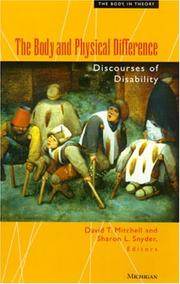| Listing 1 - 10 of 13 | << page >> |
Sort by
|

ISBN: 0472096591 0472066595 Year: 1997 Publisher: Ann Arbor, Mich. University of Michigan Press
Abstract | Keywords | Export | Availability | Bookmark
 Loading...
Loading...Choose an application
- Reference Manager
- EndNote
- RefWorks (Direct export to RefWorks)
History of civilization --- Sociology of disability. --- Handicap --- Aspect sociologique --- Humanities --- Social aspects --- Methodology.

ISBN: 0226767329 0226767310 9786612679322 0226767302 1282679325 Year: 2006 Publisher: Chicago University of Chicago press
Abstract | Keywords | Export | Availability | Bookmark
 Loading...
Loading...Choose an application
- Reference Manager
- EndNote
- RefWorks (Direct export to RefWorks)
In Cultural Locations of Disability, Sharon L. Snyder and David T. Mitchell trace how disabled people came to be viewed as biologically deviant. The eugenics era pioneered techniques that managed ""defectives"" through the application of therapies, invasive case histories, and acute surveillance techniques, turning disabled persons into subjects for a readily available research pool. In its pursuit of normalization, eugenics implemented disability regulations that included charity systems, marriage laws, sterilization, institutionalization, and even extermination. Enacted in enclos
#SBIB:39A9 --- #SBIB:316.8H11 --- Medische antropologie / gezondheid / handicaps --- Welzijns- en sociale problemen: gehandicapten (fysiek, mentaal) --- People with disabilities in motion pictures. --- People with disabilities --- Sociology of disability. --- Geschiedenis van opvoeding en onderwijs --- Government policy. --- Social conditions. --- handboeken en inleidingen --- People with disabilities - Government policy. --- People with disabilities -- Government policy. --- People with disabilities - Social conditions. --- People with disabilities -- Social conditions. --- Persons --- History --- Socioeconomic Factors --- Sociology --- Social Conditions --- Disabled Persons --- Eugenics --- Named Groups --- Humanities --- Population Characteristics --- Social Sciences --- Anthropology, Education, Sociology and Social Phenomena --- Health Care --- Social Welfare & Social Work --- Disabilities --- handboeken en inleidingen. --- Handboeken en inleidingen. --- People with disabilities in motion pictures --- Sociology of disability --- Sociology of disablement --- Sociology of impairment --- Cripples --- Disabled --- Disabled people --- Disabled persons --- Handicapped --- Handicapped people --- Individuals with disabilities --- People with physical disabilities --- Persons with disabilities --- Physically challenged people --- Physically disabled people --- Physically handicapped --- Handicapped in motion pictures --- Motion pictures --- Government policy --- Social conditions --- Sociological aspects
Multi
ISBN: 9781350029538 135002953X 9781350028524 1350028525 9781350028715 1350028711 9781350028876 1350028878 9781350028913 1350028916 9781350029071 1350029076 9781350029293 1350029297 Year: 2020 Publisher: London Bloomsbury Academic
Abstract | Keywords | Export | Availability | Bookmark
 Loading...
Loading...Choose an application
- Reference Manager
- EndNote
- RefWorks (Direct export to RefWorks)
How has our understanding and treatment of disability evolved in Western culture? How has it been represented and perceived in different social and cultural conditions? In a work that spans 2,500 years, these ambitious questions are addressed by over 50 experts, each contributing their overview of a theme applied to a period in history. The volumes describe different kinds of physical and mental disabilities, their representations and receptions, and what impact they have had on society and everyday life.Individual volume editors ensure the cohesion of the whole, and to make it as easy as possible to use, chapter titles are identical across each of the volumes. This gives the choice of reading about a specific period in one of the volumes, or following a theme across history by reading the relevant chapter in each of the six. The six volumes cover: 1. - Antiquity (500 BCE - 500 CE); 2. - Middle Ages (500 - 1450); 3. - Renaissance (1400 - 1650) ; 4. - Long Eighteenth Century (1650 - 1800); 5. - Long Nineteenth Century (1800 - 1920); 6. - Modern Age (1920 - 2000+). Themes (and chapter titles) are: atypical bodies; mobility impairment; chronic pain and illness; blindness; deafness; speech; learning difficulties; mental health. The page extent is approximately 2,000 pages with c. 200 illustrations. Each volume opens with Notes on Contributors, a series preface and an introduction, and concludes with notes, bibliography and an index.
History of human medicine --- History of civilization --- handicapped --- Disabilities --- People with disabilities --- Sociology of disability --- History --- Sociology of disablement --- Sociology of impairment --- Cripples --- Disabled --- Disabled people --- Disabled persons --- Handicapped --- Handicapped people --- Individuals with disabilities --- People with physical disabilities --- Persons with disabilities --- Physically challenged people --- Physically disabled people --- Physically handicapped --- Persons --- Disability --- Disabling conditions --- Handicaps --- Impairment --- Physical disabilities --- Physical handicaps --- Diseases --- Wounds and injuries --- Animals with disabilities --- Sociological aspects --- anno 500-1499 --- anno 1400-1499 --- anno 1500-1599 --- Handicap --- Handicapés --- History. --- Histoire --- Histoire. --- Antiquity --- anno 1700-1799 --- anno 1800-1899 --- anno 1900-1999 --- Ancient history --- Handicapés
Book
ISBN: 9780472067480 Year: 2000 Publisher: Ann Arbor : University of Michigan Press,
Abstract | Keywords | Export | Availability | Bookmark
 Loading...
Loading...Choose an application
- Reference Manager
- EndNote
- RefWorks (Direct export to RefWorks)
"Narrative Prosthesis: Disability and the Dependencies of Discourse develops a narrative theory of the pervasive use of disability as a device of characterization in literature and film. It argues that, while other marginalized identities have suffered cultural exclusion due to a dearth of images reflecting their experience, the marginality of disabled people has occurred in the midst of the perpetual circulation of images of disability in print and visual media. The manuscript's six chapters offer comparative readings of key texts in the history of disability representation, including the tin soldier and lame Oedipus, Montaigne's "infinities of forms" and Nietzsche's "higher men," the performance history of Shakespeare's Richard III, Melville's Captain Ahab, the small town grotesques of Sherwood Anderson's Winesburg, Ohio and Katherine Dunn's self-induced freaks in Geek Love."--Publisher's description. The author argues that, while other marginalized identities have suffered cultural exclusion due to a dearth of images reflecting their experience, the marginality of disabled people has occurred in the midst of the perpetual circulation of images of disability in print and visual media.
Disabled Persons --- Literature, Modern --- Literature, Modern. --- People with disabilities in literature. --- History. --- History and criticism.
Periodical
Year: 2004 Publisher: ann Arbor The University of Michigan Press
Abstract | Keywords | Export | Availability | Bookmark
 Loading...
Loading...Choose an application
- Reference Manager
- EndNote
- RefWorks (Direct export to RefWorks)
Book
ISBN: 0873529804 0873529812 Year: 2002 Publisher: New York Modern language association of America
Abstract | Keywords | Export | Availability | Bookmark
 Loading...
Loading...Choose an application
- Reference Manager
- EndNote
- RefWorks (Direct export to RefWorks)
Disability studies --- Humanities --- People with disabilities in literature --- Sociology of disability


ISBN: 0761925651 9780761925651 Year: 2006
Abstract | Keywords | Export | Availability | Bookmark
 Loading...
Loading...Choose an application
- Reference Manager
- EndNote
- RefWorks (Direct export to RefWorks)
Social medicine --- Sociology of health --- Social policy and particular groups --- Disability studies --- Etudes sur le handicap --- 376 <09> --- Buitengewoon onderwijs. Orthopedagogiek. Gehandicapte kinderen: opvoeding en onderwijs. Speciaal onderwijs.--Geschiedenis van ... --- 376 <09> Buitengewoon onderwijs. Orthopedagogiek. Gehandicapte kinderen: opvoeding en onderwijs. Speciaal onderwijs.--Geschiedenis van ... --- People with disabilities --- Sociology of disability --- Disabilities --- Sociology of disablement --- Sociology of impairment --- Cripples --- Disabled --- Disabled people --- Disabled persons --- Handicapped --- Handicapped people --- Individuals with disabilities --- People with physical disabilities --- Persons with disabilities --- Physically challenged people --- Physically disabled people --- Physically handicapped --- Persons --- Education --- Buitengewoon onderwijs. Orthopedagogiek. Gehandicapte kinderen: opvoeding en onderwijs. Speciaal onderwijs.--Geschiedenis van .. --- Sociological aspects --- Study and teaching --- Curricula --- Handicapés --- Handicap --- Encyclopedias --- Encyclopédies --- Aspect sociologique --- Buitengewoon onderwijs. Orthopedagogiek. Gehandicapte kinderen: opvoeding en onderwijs. Speciaal onderwijs.--Geschiedenis van . --- Buitengewoon onderwijs. Orthopedagogiek. Gehandicapte kinderen: opvoeding en onderwijs. Speciaal onderwijs.--Geschiedenis van
Book
ISBN: 0472121189 Year: 2015 Publisher: Ann Arbor [Michigan] : University of Michigan Press,
Abstract | Keywords | Export | Availability | Bookmark
 Loading...
Loading...Choose an application
- Reference Manager
- EndNote
- RefWorks (Direct export to RefWorks)
In the neoliberal era, when human worth is measured by its relative utility within global consumer culture, selected disabled people have been able to gain entrance into late capitalist culture. The Biopolitics of Disability terms this phenomenon "ablenationalism" and asserts that "inclusion" becomes meaningful only if disability is recognized as providing modes of living that are alternatives to governing norms of productivity and independence. Thus, the book pushes beyond questions of impairment to explore how disability subjectivities create new forms of embodied knowledge and collective consciousness. The focus is on the emergence of new crip/queer subjectivities at work in disability arts, disability studies pedagogy, independent and mainstream disability cinema (e.g., Midnight Cowboy), internet-based medical user groups, anti-normative novels of embodiment (e.g., Richard Powers's The Echo-Maker) and, finally, the labor of living in "non-productive" bodies within late capitalism.
Disability studies. --- People with disabilities --- Disabilities --- Civil rights. --- Social conditions. --- Government policy.
Book
ISBN: 0472125095 Year: 2019 Publisher: Ann Arbor, Michigan : University of Michigan Press,
Abstract | Keywords | Export | Availability | Bookmark
 Loading...
Loading...Choose an application
- Reference Manager
- EndNote
- RefWorks (Direct export to RefWorks)
The Matter of Disability returns disability to its proper place as an ongoing historical process of corporeal, cognitive, and sensory mutation operating in a world of dynamic, even cataclysmic, change. The book's contributors offer new theorizations of human and nonhuman embodiments and their complex evolutions in our global present, in essays that explore how disability might be imagined as participant in the "complex elaboration of difference," rather than something gone awry in an otherwise stable process. This alternative approach to materiality sheds new light on the capacities that exist within the depictions of disability that the book examines, including Spider-Man, Of Mice and Men, and Bloodchild.
People with disabilities --- Disability studies. --- Sociology of disability. --- Social conditions.
Book
ISBN: 0472126903 Year: 1999 Publisher: Ann Arbor, Michigan : University of Michigan Press,
Abstract | Keywords | Export | Availability | Bookmark
 Loading...
Loading...Choose an application
- Reference Manager
- EndNote
- RefWorks (Direct export to RefWorks)
The first book to attempt to provide a framework for analyzing disability through the ages, Henri-Jacques Stiker's now classic A History of Disability traces the history of western cultural responses to disability, from ancient times to the present. The sweep of the volume is broad; from a rereading and reinterpretation of the Oedipus myth to legislation regarding disability, Stiker proposes an analytical history that demonstrates how societies reveal themselves through their attitudes towards disability in unexpected ways. Through this history, Stiker examines a fundamental issue in contemporary Western discourse on disability: the cultural assumption that equality/sameness/similarity is always desired by those in society. He highlights the consequences of such a mindset, illustrating the intolerance of diversity and individualism that arises from placing such importance on equality. Working against this thinking, Stiker argues that difference is not only acceptable, but that it is desirable, and necessary. This new edition of the classic volume features a new foreword by David T. Mitchell and Sharon L. Snyder that assesses the impact of Stiker's history on Disability Studies and beyond, twenty years after the book's translation into English. The book will be of interest to scholars of disability, historians, social scientists, cultural anthropologists, and those who are intrigued by the role that culture plays in the development of language and thought surrounding people with disabilities.
People with disabilities --- Disabilities --- Social conditions. --- History.
| Listing 1 - 10 of 13 | << page >> |
Sort by
|

 Search
Search Feedback
Feedback About UniCat
About UniCat  Help
Help News
News